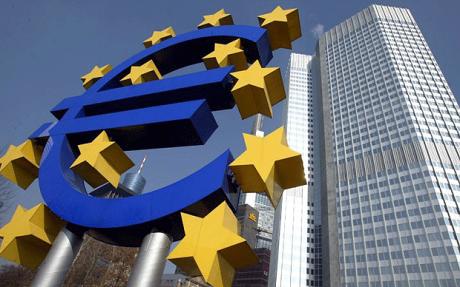Eurozone’s economy grew by just 0.1% in Q3 2013, down from 0.3% growth in the previous quarter.
The figure marks just the second quarter of a growth phase that replaced an 18-month recession, the longest period of contraction to affect the single currency area.
It shows the eurozone’s recovery is extremely tentative.
Europe’s Central Bank last week cut interest rates to 0.25% to lift growth.
Europe’s economy is taking far longer to recover than the other advanced regions affected by the credit crisis of 2008.
Weaker countries in the eurozone have been propped up by bailout money, advanced on condition they cut government spending sharply to reduce their debts.
Moves to do this have hit directly at voters, through large-scale job cuts, reduced wages and pensions, higher taxes and widespread changes to public services.
With the resulting higher unemployment and fall in living standards, few economists think there is much there to drive forward a robust recovery.
Growth of 1.1% is being predicted by the European Commission for next year and 1.7% in 2015.

The US, with its own giant government debt, is currently growing at an annualized rate of 2.8%, compared with the eurozone’s rate so far this year of about 0.4%.
Even figures from the region’s strongest and most important economies, France and Germany, proved disappointing.
France shrank 0.1% in the third quarter of the year, while German growth slowed to 0.3% from 0.7% in the previous quarter.
Figures from Italy, the third most important country, showed its economy shrank by 0.1%, after a 0.3% contraction in the second quarter.
There were better signs of economic activity from some of the worst-hit countries in southern Europe.
Spain returned to quarter-on-quarter growth for the first time since the first quarter of 2011, albeit with growth of just 0.1%.
Portugal’s economy grew by 0.2% in the quarter.
When France’s economy grew by 0.5% in the second quarter of the year, it pulled the country out of recession, although economists had not expected that level of growth to be sustained.
Figures from the national statistics agency Insee showed that exports dropped by 1.5% in the third quarter, while business investment fell by 0.6%.
However, France’s Finance Minister, Pierre Moscovici, said he still believed the economy would grow by 0.1-0.2% over 2013 as a whole.
Germany’s statistics office Destatis also cited weak exports as a factor holding back growth.
[youtube rjb6CEx_mGs 650]
